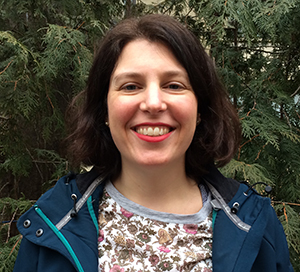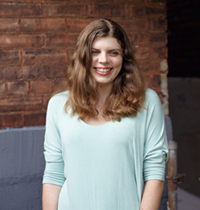The Opinions of Our Century:
Jess Taylor in Conversation
with Rebecca Morris

Canadian writer Jess Taylor talks with Rebecca Morris, winner of the Open Season Awards (fiction category) for 2017 with her story, “Foreign Bodies.”
Read what contest judge Jaspreet Singh had to say about Morris’ winning short story.
Your point-of-view in “Foreign Bodies” is very closely tied to your main character, Marhya. We have access to her thoughts, language, worries, preoccupation with germs, and her perceptions of other characters. This allows the ending, without giving too much away, to pack more of a punch. Did you have an idea before you began writing this story that the ending would hinge on a reversal like this?
In earlier versions of the story I gave Marhya more agency, and the ending was going to be more about her decisions and her rejection of the “fate” that she’d been handed. I also played with the idea of contrasting a happy ending with Romeo and Juliet’s tragedy; I wanted to write Marhya as a strong, sensible and determined girl with 21st-century options.
As I reworked the story, however, I realized that she needed to have less control over events. Her desperation gives the story its tension. Marhya is a smart girl who thinks she understands her situation, but I didn’t want her to see the ending coming.
Are you often concerned with how someone’s perceptions of a character or a situation may be mistaken? Aside from the ending, it seems that Marhya is also very concerned with what others might project onto her without knowing what she’s experiencing. Her best friend, Rachel; her parents and relatives; and her classmates all judge her behaviour or attempt to construct a moral code that she should live by. Is this something that you keep coming back to in your writing?
Absolutely. I think we all misread people and situations all the time, based on our own expectations and whatever we’ve got happening in our own lives. We also hide our real feelings and misrepresent ourselves to the rest of the world. I see a huge scope for drama there. That whole idea of “if they only knew”—I think it’s fascinating.
“Foreign Bodies” takes place in a contemporary high school English class, full of students from culturally diverse backgrounds. The classroom dynamics feel realistic and effortless. Was it important to you politically, especially considering the current political climate, to represent this diversity or were you hoping to capture a realistic city classroom? Or both?
Let’s say both. I have taught high school and worked with international students, so the diversity of Marhya’s peer group was fairly natural for me to write. Lots of Montreal classrooms are full of first-generation Canadians who have to navigate different cultural expectations on top of typical adolescent challenges and dramas.
In addition, I’m a big believer in multiculturalism and I think everybody benefits from an environment where there is diversity. Despite their different backgrounds, I wanted to show that the students in Marhya’s class are all just trying to fit in and get on with their lives.
How does writing fit into your daily life? Do you ever find it difficult to balance writing with your other responsibilities? How do you strike this balance?
I have three school-aged children and I often feel like I have to choose between being a good mother and a good writer. I have learned to be disciplined but flexible, and I am extremely protective of my writing time. I prioritize a good writing day over a clean house!
For many years I worked as a teacher, so I had to schedule my writing time early in the morning or on weekends. This year, I transitioned to writing full-time and I feel very lucky to be able to focus more of my energy and time on my creative work.
You mentioned to me that you spend a lot of your time working on a novel. Tell us about this project!
My novel involves two main characters who were friends as adolescents and reconnect when one of them comes back to town after ten years. One of the women has a birthmark across her face and dedicates her time to hiding it; the other has covered herself in tattoos. The book alternates between the two characters’ stories as one of them tries to solve the mystery behind a devastating incident at a high school party. I’m exploring themes like friendship, memory, image and status. These characters have been haunting me for years. I’m currently almost half-way through a new draft, which I hope to have finished by June.
Do you feel like your novel writing is similar to your short fiction or do you find the impulse to work longer much different?
They are very different processes. Writing a novel is like a marriage; it requires long-term dedication. In contrast, writing short fiction is like having a wild romantic fling (and sometimes it feels like I’m cheating on my novel).
I only started writing short stories last year. There’s a level of precision with short fiction that is very satisfying, as is the challenge of working within a word limit. I love letting myself get caught up in the world of a new story, finding a shape for the narrative and polishing the language. Then there’s the satisfaction of actually finishing the story and sending it out into the world, which is a still long way off for my novel.
Your Open Season Award and publication in the Malahat counts as your first publication. How do you feel about it? Has it changed your relationship to your writing at all to know that it is now something that will be published and read by other people?
I am thrilled and grateful to win this award and to be seeing my work in print for the first time. I can call myself a real writer now! It’s very validating to know that my work is appreciated and that it will be read by a bigger audience than my friends, family and writing group. Having a story published gives me extra motivation to push through my doubts and keep focusing my energy on my writing.

Jess Taylor
* * * * * * * *









